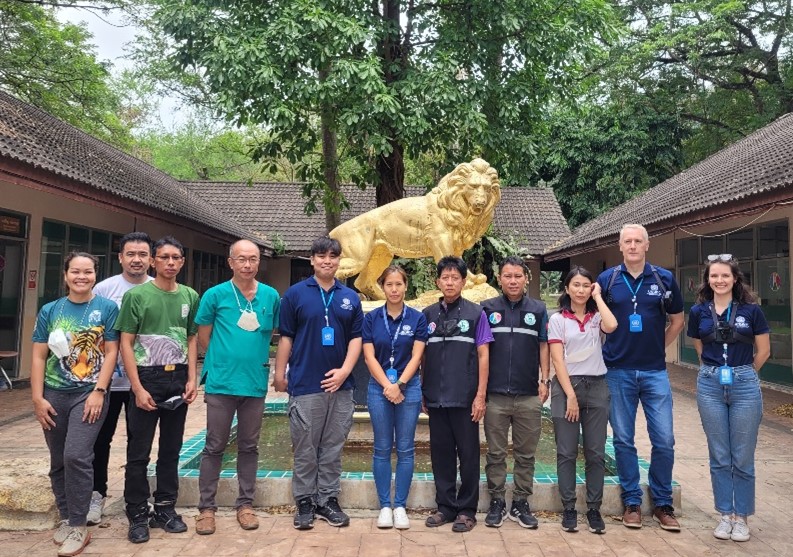
Khao Keow zoo staff participated in the interview with the UNODC research team
Chonburi province (Thailand), 26 October 2022 – Supported by the Department of National Parks of Thailand, the United Nations Office of Drugs and Crime (UNODC) Environment Team started field visits for the SAFE Project, the first of a series of 40 planned visits. The first facilities visited by the SAFE Team - the Khao Keow Zoo and the Mong Chang Cafe - offered a peaceful escape from the chaotic buzz of the city.
Working with the Zoological Park Organization of Thailand (ZPOT), the research team met with owners and staff of two facilities where animals, ranging from civets to macaques and elephants, have interactions with people.
“Wild animal business is common practice [in Thailand]. We, as part of the community, are happy to work with project SAFE to build understanding to improve safety for both the public and animals.” explained the owner of the Mong Chang Café.
A comprehensive 115-point questionnaire is used to collect data from each facility through an interview process. In addition, observations on the facility’s operations are made during a tour to assess and discuss potential risks and how to reduce them.
An important component of the work is awareness-raising among those working in the wildlife sector about zoonotic disease risk, with the aim of protecting staff and the public and correctly registering commercial wildlife operations. Registration and effective inspections are two key components of the sound management of facilities, to also ensure compliance, integrity, and the legality of the operation.
“A One Health approach is essential and it can start with simple interventions we can make right now that have immediate impacts in reducing zoonotic spillover and transmission. To implement those interventions, we need to work collaboratively with the commercial wildlife sector helping them become compliant with appropriate regulations and operating in ways that reduce zoonotic disease risk and the compounding issue of wildlife crime” explained Dr Ross McEwing, UNODC Project Officer and part of the research team.
At the outset of the project, the SAFE Project team co-operated with government counterparts and scientists to develop a risk assessment framework upon which the questionnaire is based. After Thailand, similar field visits will follow in other priority countries of the project, namely Lao PDR, Sabah State of Malaysia, and Viet Nam, to ensure that facilities in which wild animals and humans interact are equipped to understand risks of zoonotic disease transmission.
The results of the assessment will be analyzed by a SAFE Project team of wildlife and public health experts and be used to support interventions and mitigation measures at the local level a policy changes at the regional level to reduce the threat of zoonotic disease emergence, transmission, and future pandemics.

Dr. Visit Arsaithamkul (Khao Keow) explaining risk-reduction measures already undertaken by the zoo

Owner and management team of the Mong Chang Café share knowledge during the interview questionnaire

The research team thanks the owner of the Mong Chang Café for welcoming the team on one of the first field visits
Click here to learn more about the SAFE Project
Click here to learn more about UNODC's Regional Programme for Southeast Asia and the Pacific
Click here to learn more about UNODC’s Global Programme on Crimes that Affect the Environment
The SAFE project is implemented by the UNODC Environment Team in cooperation with the United Nations Environment Programme and the Food and Agriculture Organization of the United Nations, and benefits from the financial support of the European Union.